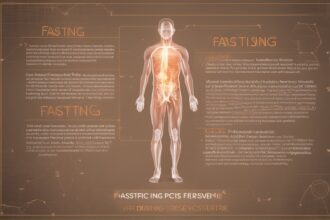Welcome to the fascinating world of fasting science! If you’ve ever wondered whether skipping meals could actually be good for you, you’re in the right place. Over the past decade, research into fasting—particularly intermittent fasting—has exploded, revealing surprising benefits for weight loss, metabolic health, and even longevity. In this post, we’ll dive deep into the latest studies on fasting, break down the science behind it, and offer practical tips to help you incorporate fasting into your life. Whether you’re a beginner or a seasoned faster, let’s explore how this ancient practice is being validated by modern science.
What Is fasting Science and Why Does It Matter?
At its core, fasting science is the study of how periods of voluntary food abstinence impact the body and mind. Fasting isn’t just a trend; it’s a practice rooted in human history, often tied to religious or cultural traditions. Today, scientists are uncovering why fasting works on a cellular level. Research shows that fasting triggers processes like autophagy—where cells clean out damaged components—and ketosis, where the body burns fat for fuel. These mechanisms are linked to improved health markers, making fasting a hot topic in fields like nutrition and longevity research. Understanding the science behind fasting helps us make informed choices about when and how to fast for maximum benefits.
Key Findings from Recent Fasting Studies
The body of research on intermittent fasting studies is growing rapidly, with exciting discoveries about its effects. A 2021 study published in the journal Cell Metabolism found that intermittent fasting (IF) can improve insulin sensitivity, a critical factor in preventing type 2 diabetes. Another study from the University of Illinois at Chicago showed that alternate-day fasting led to significant weight loss and reduced blood pressure in obese adults. Beyond physical health, fasting science also points to mental benefits. Research from Johns Hopkins University suggests that fasting may enhance brain function by promoting the production of brain-derived neurotrophic factor (BDNF), a protein linked to learning and memory. These findings highlight why fasting isn’t just about cutting calories—it’s about optimizing how our bodies function.
Health Benefits Backed by Fasting Research
Let’s break down some of the most compelling health benefits supported by fasting research. Fasting doesn’t just help with shedding pounds; it impacts nearly every system in the body. Here are a few standout benefits:
- Weight Management: Intermittent fasting helps reduce calorie intake and boosts metabolism by increasing levels of norepinephrine, a fat-burning hormone.
- Heart Health: Studies show fasting can lower LDL cholesterol, triglycerides, and blood pressure, reducing the risk of cardiovascular disease.
- Cellular Repair: Fasting triggers autophagy, a process that removes damaged cells and may protect against diseases like cancer and Alzheimer’s.
- Improved Longevity: Animal studies suggest fasting mimics calorie restriction, a known factor in extending lifespan, though human trials are ongoing.
These benefits make fasting a powerful tool, but it’s important to approach it with knowledge and caution, as we’ll discuss later.
How Fasting Affects Your Body on a Cellular Level
Diving deeper into fasting science explained, let’s talk about what happens inside your body during a fast. When you stop eating for an extended period, your body shifts gears. After about 12–16 hours without food, glycogen stores in the liver are depleted, and your body begins to burn fat for energy, producing ketones. This state of ketosis isn’t just about weight loss; ketones are also thought to have anti-inflammatory effects. Additionally, fasting reduces oxidative stress and inflammation—two drivers of chronic disease. On a genetic level, fasting influences gene expression related to stress resistance and repair. It’s like hitting a reset button for your cells, giving them a chance to clean house and rebuild stronger.
Practical Tips to Start Fasting Safely
Now that we’ve covered the science of fasting, how do you actually get started? Fasting isn’t a one-size-fits-all practice, and jumping in without preparation can lead to frustration or health issues. The key is to ease into it and listen to your body. Here are some actionable tips to help you begin your fasting journey based on insights from fasting science:
- Start Small: If you’re new, try a 12:12 schedule—12 hours of fasting (including sleep) and a 12-hour eating window—before moving to 16:8 or other methods.
- Stay Hydrated: Drink plenty of water during fasting periods to avoid dehydration, and consider black coffee or tea to curb hunger.
- Choose Nutrient-Dense Foods: When breaking your fast, focus on whole foods like vegetables, lean proteins, and healthy fats to support your body’s needs.
- Avoid Overeating: It’s tempting to binge after fasting, but this can undo benefits. Eat mindfully and stop when you’re full.
- Consult a Professional: If you have medical conditions like diabetes or are pregnant, speak with a doctor before starting any fasting regimen.
By following these steps, you can align your fasting practice with the principles of fasting health studies and set yourself up for success.
Common Myths and Misconceptions About Fasting
Despite the growing body of fasting science, myths still abound. One common misconception is that fasting means starvation, but that’s far from true. Fasting, when done correctly, is a controlled and intentional practice that provides the body with a break from constant digestion. Another myth is that fasting slows metabolism. In reality, short-term fasting can increase metabolic rate as the body ramps up fat-burning processes. Some also believe fasting leads to muscle loss, but studies show that intermittent fasting preserves muscle mass better than traditional calorie restriction, especially when paired with resistance training. Clearing up these myths with evidence from fasting research studies helps people approach fasting with confidence rather than fear.
As we’ve seen, fasting science offers a wealth of insights into how this practice can transform our health. From improving insulin sensitivity to promoting cellular repair, the benefits of fasting are backed by rigorous studies and real-world results. Whether you’re looking to lose weight, boost brain function, or simply reset your relationship with food, fasting—guided by the latest research—can be a game-changer. Remember to start slow, stay informed, and tailor your approach to your unique needs. Have you tried fasting yet? Share your experiences or questions in the comments below, and let’s keep the conversation about fasting health science going. Here’s to a healthier, more intentional way of living!






